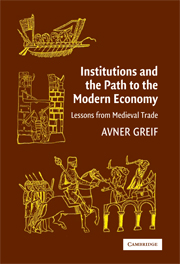Book contents
- Frontmatter
- Contents
- Abbreviations
- Preface
- I Preliminaries
- II Institutions as Systems in Equilibria
- III Institutional Dynamics as a Historical Process
- IV The Empirical Method of Comparative and Historical Institutional Analysis
- V Concluding Comments
- Appendixes
- A A Primer in Game Theory
- B Is Homo Sociologicus Strategic?
- C The Role of Theory: Reputation-Based Private-Order Institutions
- References
- Index
- POLITICAL ECONOMY OF INSTITUTIONS AND DECISIONS
A - A Primer in Game Theory
Published online by Cambridge University Press: 05 September 2012
- Frontmatter
- Contents
- Abbreviations
- Preface
- I Preliminaries
- II Institutions as Systems in Equilibria
- III Institutional Dynamics as a Historical Process
- IV The Empirical Method of Comparative and Historical Institutional Analysis
- V Concluding Comments
- Appendixes
- A A Primer in Game Theory
- B Is Homo Sociologicus Strategic?
- C The Role of Theory: Reputation-Based Private-Order Institutions
- References
- Index
- POLITICAL ECONOMY OF INSTITUTIONS AND DECISIONS
Summary
This presentation of the main ideas and concepts of game theory required to understand the discussion in this book is intended for readers without previous exposure to game theory.
A game-theoretic analysis starts by specifying the rules of the game. These rules identify the decision makers (the players), their possible actions, the information available to them, the probability distributions over chance events, and each decision maker's preference over outcomes –specifically, the set of all possible combinations of actions by the players. A game is represented, or defined, by the triplet of the players' set, the action set (which specifies each player's actions), and the payoff set (which specifies each player's payoffs as a function of the actions taken by the players). The rules of the game are assumed to be common knowledge. The situations considered are strategic in the sense that each player's optimal strategy depends on the actions of other players. (Nonstrategic situations constitute a special case.)
The objective of game-theoretic analysis is to predict behavior in strategic situations – to predict an action combination (an action to each player) for any given rules of the game. The difficulty of finding such solutions stems from the fact that because the action optimal for each player depends on others' actions, no player can choose his optimal action independently of what other players do.
- Type
- Chapter
- Information
- Institutions and the Path to the Modern EconomyLessons from Medieval Trade, pp. 407 - 420Publisher: Cambridge University PressPrint publication year: 2006
- 4
- Cited by

